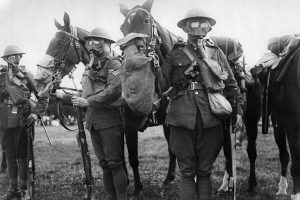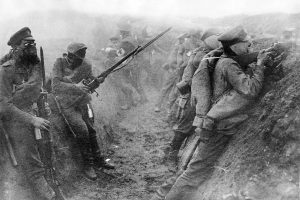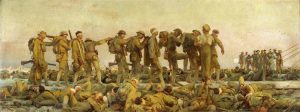Chapter 14: Machines, War, and Social Upheaval
The dawn of the 20th Century was a time of great optimism in Europe and America. Scientific and technological innovations were improving life. Economies were roaring. European colonial ambitions mastered the world at great cost to subjected peoples. And, while hot spots of violence proliferated in the colonies, Europe itself had enjoyed a near century of comparative freedom from war. People looked forward encouraged by a Myth of civilization’s Progress.
Then came 1914. Optimism crashed against the rocks of World War 1’s horrors. Four years of relentless, hopeless carnage. Millions of soldiers and civilians killed. An unimaginably futile form of warfare in which lethal machines imprisoned huge armies in mud trenches and mowed them down in waves when they surged forward under the direction of stubbornly obsolete generals. The Myth of Progress staggered and collapsed.
“Dulce et Decorum est”
British soldier Wilfrid Owen was killed just before the Armistice that ended the war. One of the “war poets” of the day—Siegried Sassoon and Rupert Brooke—Owen captured the horror of fighting in trenches under the pall of lethal clouds of gas. His poem’s title invokes in Latin an ancient patriotic formula that is presented complete in the poem’s last two lines.
Wilfred Owen. (published 1921). Dulce et Decorum est
Bent double, like old beggars under sacks,
Knock-kneed, coughing like hags, we cursed through sludge,
Till on the haunting flares we turned our backs,
And towards our distant rest[1] began to trudge.
Men marched asleep. Many had lost their boots,
But limped on, blood-shod. All went lame; all blind;
Drunk with fatigue; deaf even to the hoots
Of gas-shells dropping softly behind.
Gas! Gas![2] Quick, boys! – An ecstasy of fumbling,
Fitting the clumsy helmets[3] just in time;
But someone still was yelling out and stumbling,
And flound’ring like a man in fire or lime . . .
Through the misty panes and thick green light,[4]
As under a green sea, I saw him drowning.
In all my dreams, before my helpless sight,
He plunges at me, guttering, choking, drowning.
If in some smothering dreams you too could pace
Behind the wagon that we flung him in,
And watch the white eyes writhing in his face, …
If you could hear, at every jolt, the blood
Come gargling from the froth-corrupted lungs,[5]
Obscene as cancer, bitter as the cud
Of vile, incurable sores on innocent tongues,
My friend, you would not tell with such high zest
To children ardent for some desperate glory,
The old Lie; Dulce et Decorum est
Pro patria mori.
[1] Our distant rest: i.e. back to the miserable mud of the trenches after another failed assault on the enemy line with its murderous machine guns
[2] Gas! Gas! i.e. phosgene or chlorine gas which destroyed lung tissue and left people who breathed it either dead or compromised in their breathing perhaps for life
[3] Fitting the clumsy helmets: i.e. helmets equipped with masks which screened out the lethal gas
[4] Thick green light: the viewpoint here is through cloudy lenses in the masks and then through green-tinted clouds of gas
[5] Froth-corrupted lungs: a vivid description of the effects on the body of a gas attack
Dulce et Decorum est pro patria mori: “Sweet and decorous it is to die for one’s homeland.” This expression, attributed the Odes of the Roman poet Horace (III.2.13), encapsulated the fierce patriotism, illustrated in Jacques-Louis David’s Oath of the Horatii, which drove citizens of the Roman Republic to serve in the conquest of an empire. When war broke out in 1914, hundreds of thousands of British, French, German, Austrian, and Russian young men thronged to the recruiting stations to join the great and romantic crusade.
 |
 |
 |
| Efficiency Test for protection against gas. (September, 1917). | Scottish soldiers ready for a gas attack near the River Somme in December 1916 | John Singer Sargent. (1918). Gassed. Oil on canvas |
All wars destroy the grandiose illusions of young volunteers. But World War I destroyed the very myth of heroic combat. Raised swords and bayonets achieve nothing against machine guns’ withering fields of fire. The bravest and strongest of warriors is helpless against clouds of phosgene gas.
H. D., Dr. Williams, and other imagistes sketched lovely, inspiring glimpses of flowers and barnyard elegance. Owen invokes the power of images to force readers to sample the actual feel of combat and the horror of poison gas corrupting the lungs at a breath. “If in some smothering dreams you too could” experience the choking suffocation of a gas attack, “My friend, you would not tell with such high zest/To children ardent for some desperate glory,/The old Lie” that combat is a path to honor.
The Lost Generation
When the war finally ground to a halt in 1918, thousands of scarred and wounded soldiers came home to try to deal with PTSD—Post Traumatic Stress Disorder—known at the time as “shell shock.” Ernest Hemingway, a young writer who had served in the Red Cross ambulance corps, was wounded and psychologically scarred by his experience of combat. He wrote moving fiction about veterans’ struggle to heal mentally. In The Sun also Rises (1926), hero Jake Barnes kicks around Europe trying to adjust to impotence after having been castrated in the war. Jake’s diffidence and mute despair personify the desolation of thousands of veterans: a title for an earlier draft was The Lost Generation, a phrase apparently coined by the American expatriate writer Gertrude Stein in whose salon Modern artists and writers from Picasso to Joyce found support.
Way back in the Introduction to our text, we sampled some fragments of Hemingway’s 1924 collection of short—very short!—stories. These vignettes reflect the fragmentary, involuntary flashbacks that haunt PTSD victims. In a later, more fully developed version of the tales, Nick Adams, the elusive hero of these teasing fragments, returns home to try to heal by fishing the Big Two Hearted River in Michigan’s Upper Peninsula. Here, we see Nick overlying moments of horror with ironically humorous memories of good moments in combat.
from In Our Time (1924)
chapter 4
We were in a garden at Mons. Young Buckley came in with his patrol from across the river. The first German I saw climbed up over the garden wall. We waited till he got one leg over and then potted him. He had so much equipment on and looked awfully surprised and fell down into the garden. Then three more came over further down the wall. We shot them. They all came just like that.
chapter 5
It was a frightfully hot day. We’d jammed an absolutely perfect barricade across the bridge. It was simply priceless. A big old wrought iron grating from the front of a house. Too heavy to lift and you could shoot through it and they would have to climb over it. It was absolutely topping. They tried to get over it, and we potted them from forty yards. They rushed it, and officers came out alone and worked on it. It was an absolutely perfect obstacle. Their officers were very fine. We were frightfully put out when we heard the flank had gone, and we had to fall back.
chapter 7
Nick sat against the wall of the church where they had dragged him to be clear of machine gun fire in the street. Both legs stuck out awkwardly. He had been hit in the spine. His face was sweaty and dirty. The sun shone on his face. The day was very hot. Rinaldi, big backed, his equipment sprawling, lay face downward against the wall. Nick looked straight ahead brilliantly. The pink wall of the house opposite had fallen out from the roof, and an iron bedstead hung twisted toward the street. Two Austrian dead lay in the rubble in the shade of the house. Up the street were other dead. Things were getting forward in the town. It was going well. Stretcher bearers would be along any time now. Nick turned his head carefully and looked down at Rinaldi. “Senta Rinaldi. Senta. You and me we’ve made a separate peace.” Rinaldi lay still in the sun breathing with difficulty. “Not patriots.” Nick turned his head carefully away smiling sweatily. Rinaldi was a disappointing audience.
chapter 8
While the bombardment was knocking the trench to pieces at Fossalta, he lay very flat and sweated and prayed oh jesus christ get me out of here. Dear jesus please get me out. Christ please please please christ. If you’ll only keep me from getting killed I’ll do anything you say. I believe in you and I’ll tell everyone in the world that you are the only thing that matters. Please please dear jesus. The shelling moved further up the line. We went to work on the trench and in the morning the sun came up and the day was hot and muggy and cheerful and quiet. The next night back at Mestre he did not tell the girl he went upstairs with at the Villa Rossa about Jesus. And he never told anybody.
“He never told anybody.” Heminway’s famously terse style and technique cut away every bit of fat and a good deal of muscle from Conventional Narrative. When writing briefly for the Kansas City Star, he learned a curt, stripped-down style with short declarative sentences from a tough editor. As a writer of fiction, he committed himself to an indirect, Ironic technique that itemized facts and left the entire task of decoding meaning to readers.
But then, a good deal of Hemingway’s fictive subject matter centered on neuroses associated with combat, bull fights, hunting safaris, and other survival venues. In the combat scenes above, we sense the terror surging just below the brittle mask of humor that manages the fear. PTSD is all about relentlessly shoving the horror back down under the skin of relationship and consciousness. For a writer whose father committed suicide, who told tales about death and survival, and who as an infirm, aged man took his own life, Hemingway did a remarkable job of not telling the whole story.
References
Goldsmith, J. (August 2, 2014). World War One: 100 pictures from the Daily Mirror archive. London, UK: Daily Mirror. (December 1916.) Daily Mirror Archives. https://www.mirror.co.uk/news/gallery/world-war-one-100-pictures-3934127
Heminway, E. (1924). in our time. Paris, FR: Three Mountain Press. Project Gutenberg. https://www.gutenberg.org/ebooks/61085
Owen, W. (1921). Dulce et decorum establish [Poem]. In Poems. Poetry Foundation https://www.poetryfoundation.org/poems/46560/dulce-et-decorum-est
Singer Sargent, J. Gassed [Painting]. London, UK: Imperial War Museum. Wikiart https://www.wikiart.org/en/john-singer-sargent/gassed-1918
organically rooted in a culture’s heritage, a connected web of narratives, rituals, and art that illuminate origins, shape beliefs, map the world, and guide members of the culture in proper values, behavior and navigation of the environment
